|
132 London Road (Buckland Street 1861 ) )
Dover
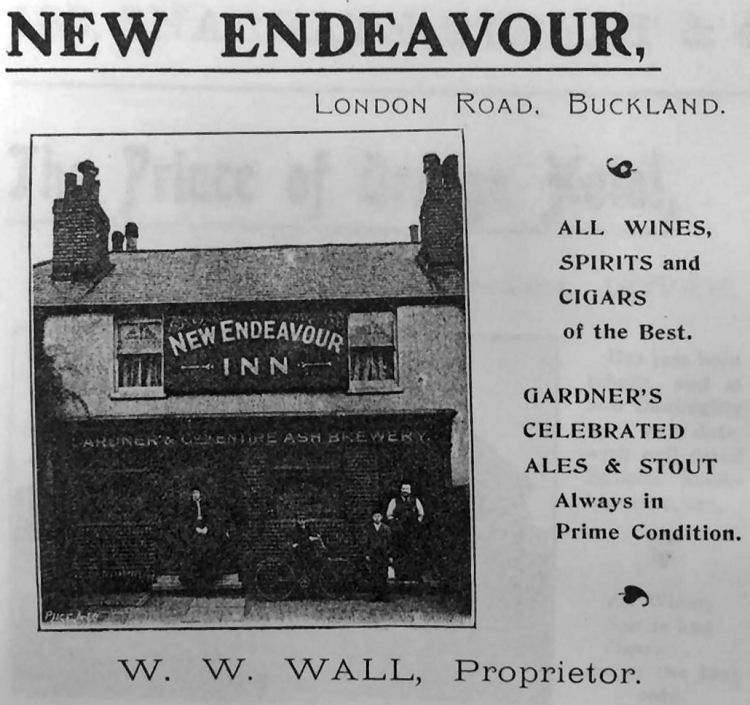
Above advert, circa 1900. Kindly sent by Kevin Thorp. |
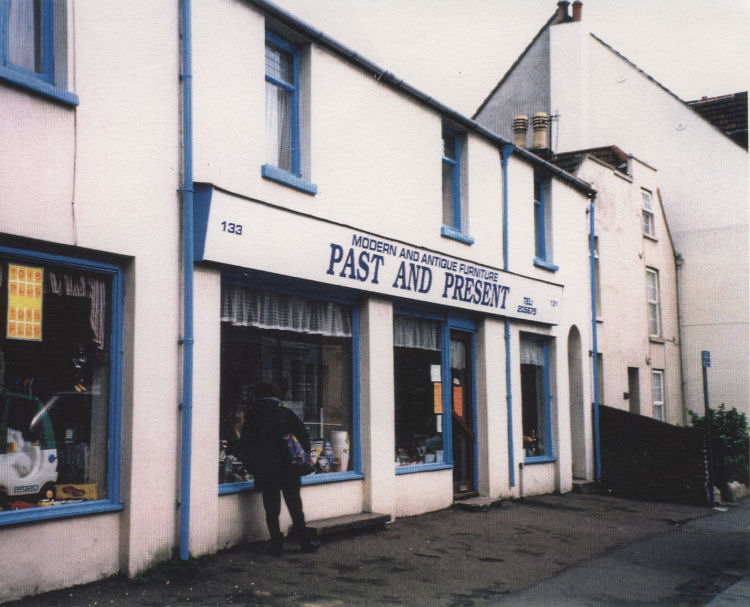
Above photo of where New Endeavour used to be circa 1995. |
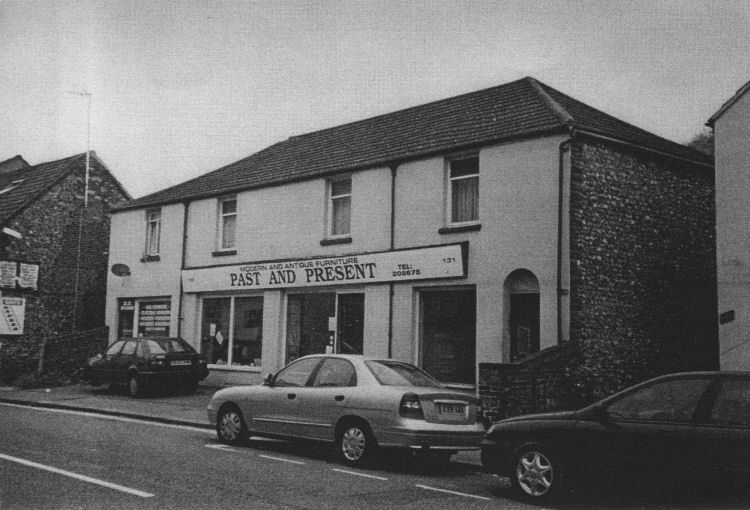 |
|
One time New Endeavour in 2003. |
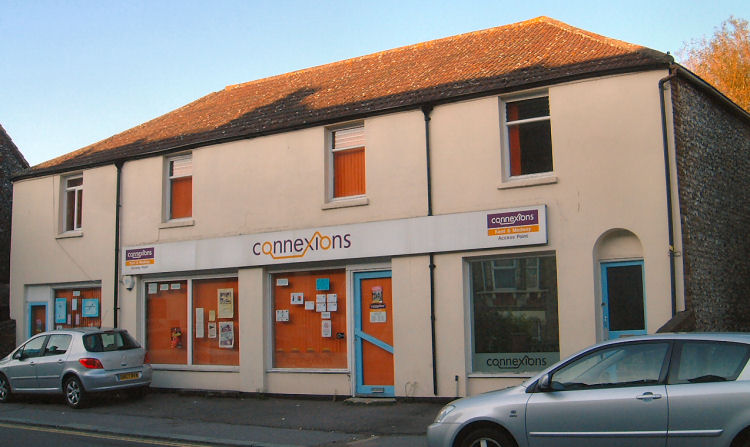 |
|
Above photo by Paul Skelton 6 Oct 2007. |
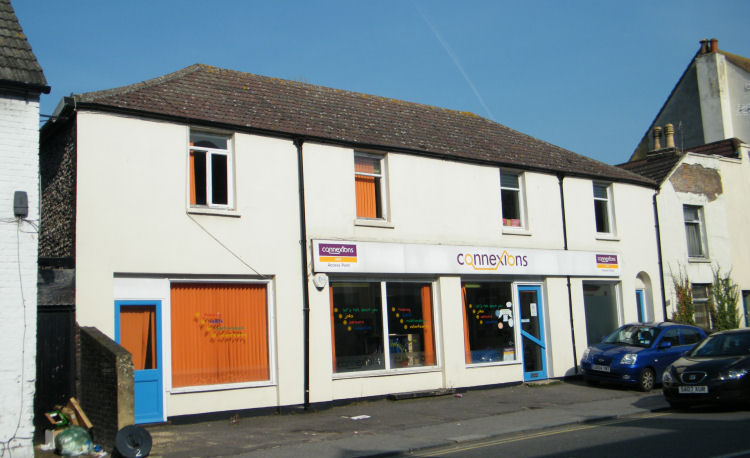
Above photograph by Paul Skelton, 9 April 2010. |

Above photo December 2015, kindly sent by Simon Draper who says the
building is now called Endeavour Cottages. Well, it had to happen,
another pub turned into flats. |
An outlet of Gardner which passed to Whitbread. The spirit licence was
issued in 1863.
Simon Draper gives me the following information:- The recent history as
I’m aware is the Abbot family ran a hardware/general store. It was then
leased to Connexxions who are a charitable organisation helping young people
into work.
A new CEO Sean Kearnes gave notice on several sites Connexxions occupied
including the Dover office. The Abbot family decided to auction the
property.
‘We, SD Property Management Ltd acquired the property for £145,000. We
spent in respect of £250,000 renovating the building into 4 x 3 bedroom
houses. The building is named Endeavour Cottages as a nod to its past usage.
The building has now been given a new lease of life albeit as family homes
but hopefully the residents support the remaining licensed establishments in
the locality.’
|
From the Dover Express and East Kent Intelligencer, 12
September, 1863.
ANNUAL LICENSES
A spirit license was granted to Charles Eastes, of the "New
Endeavour," Buckland.
|
|
From the Dover Express and East Kent Intelligencer,
1 May, 1868.
DRUNKENNESS
James Barton was charged with drunkenness and disorderly conduct at
the "New Endeavour Inn," Buckland, and with wilfully breaking the panel
of a door, value 5s.
Mr. East said: Yesterday afternoon prisoner and several others came
to my house and began to be very noisy. I ordered them out, and they
broke the door. Prisoner came back and offered to pay for it.
The prisoner was fined 5s. for being drunk and disorderly, and
ordered to pay 5s. for the damage, with costs; amounting in all to 16s.
|
|
From the Dover Express and East Kent News, Friday 23 August, 1878
SHOP LIFTING
Charles Foster and James Gammon, privates belonging to the 2nd
Battalion, 6th Regiment, were charged with stealing from a shop, No. 7,
London Road, Buckland, 20lbs. of cheese, of the value 10s., the property
of James Frederick Howard.
James Frederick Howard said: I am a grocer, carrying on business in
London Road, Buckland. The piece of cheese now produced is my property.
It was lying on the counter. Last night, about five minutes to ten, I
was behind my counter writing, when I heard a noise and on looking up I
saw the prisoner Foster in the act of taking the piece of cheese away,
and directly he saw me he walked out of the shop taking it with him. I
went after him and he put the piece of cheese on the ground close by the
shop. I gave information to the Police and afterwards saw the two
prisoners at the Police-station where I preferred the charge. There was
another piece of cheese missing but I did not miss that at first. The
two pieces of cheese weighed about 20lbs., and the value is 10s. I am
sure Foster was the man I saw in my shop. The other prisoner was
outside, and they both went away together up the road.
William Frederick East said: I live at the “New Endeavour,” Buckland,
which is kept by my father. Last night, about ten minutes past ten, the
two prisoners came into the bar. Foster had a piece of cheese weighing
about 12lbs., and asked me if I would buy it. I told him I did not want
his cheese and he had better go out. Foster then asked me to give him
some beer for it. I refused to do so and the prisoners went away taking
the cheese with them. About a quarter-of-an-hour later they returned.
They had no cheese then. They called for some beer, but my father – who
was behind the bar at the time – refused to serve them. Just then
Police-constable Cadman came in and charged them with breaking some
windows. He took their belts and they went away. I saw them again
outside when they where charged with stealing the cheese. Foster went
quietly, but I saw Gammon kick and strike at one of the Constables who
was assisting.
Police-constable Cadman said: last night, about 10 o'clock, I was on
duty in the London Road, when my attention was called to Mr. Howard, the
grocer, who told me that two soldiers had stolen some cheese from his
shop. I went after them and met the two prisoners coming down the road
by the “Bull Inn.” I let them pass and then I followed them and saw
Gammon put his stick through two panes of glass at Mrs. Harman's. They
then went into Mr. East's, the “New Endeavour,” where I stopped them and
took their belts and charged them with breaking the glass. They went
back with me to Mrs. Harman's and paid her for the windows in my
presence, and in consequence I gave them back their belts. Mr. East
afterwards told me that the prisoners had been offering a piece of
cheese at his house, and in consequence of that I went after the
prisoners and told them I should take them into custody on suspicion of
stealing a piece of cheese from Mr. Howard's. they refused to go and I
sent for assistance, and Police-constable Edmunds and Blakely came and
we took them to the Police-station. Gammon was very violent and kicked
Edmunds in the back six or seven times. On the way to the Station Foster
said to Gammon, “Never mind chum, we had a good gut full of cheese, and
sold the rest for a shilling.”
The Officer in attendance said Foster bore a fait character and Gammon a
bad one.
Prisoner pleaded “Guilty” to the charge, and the bench sentenced them to
three months' imprisonment with hard labour.
|
|
From the Dover Express and East Kent Intelligencer, 3 January, 1882. Price 1d.
SAD CASE OF SUICIDE
We regret to hear that Mr. Stephens, landlord of the “Old Endeavour
Inn,” (sic) Buckland, committed suicide this morning by cutting his throat.
|
|
From the Dover Express and East Kent Intelligencer, 15 September, 1882. Price 1d.
HORRIBLE SUICIDE AT BUCKLAND
Considerable excitement occurred at Buckland on Saturday afternoon last
by the report of a horrible and shocking case of suicide, that had taken
place. Report of firearms were heard in the direction of the Old Park
Road, and on proceeding there it was found that a man, afterwards
described as being an officer's servant, of the name of John West, was
lying in a pool of blood under an elderberry tree, with a pistol firmly
clasped in his right hand, and with every appearance of having committed
suicide by shooting himself in the head. A constable arrived shortly
after the discovery of the body, and on examining it he found that the
right side of the head, including the ear, had been completely blown
away, apparently by the pistol which was so firmly clasped in the right
hand of the deceased. Lying on the side of the deceased was a pistol
case, containing several bullets and a quantity of powder and caps. The
first notice that was taken of the man was at the “New Endeavour,” where
he called for refreshment, remaining about three quarters of an hour,
and during that time it is supposed that he loaded the pistol, some
powder being afterwards found on the ground near where he sat. The
manager of the “New Endeavour” spoke to the deceased, who seemed very
depressed in spirits, and answered in a very low tone, but kept
continually turning over and over a case which he had in a red
handkerchief. He was seen to leave the house quite sober, and then
proceeded to the Old Park Road, and on arriving near a large tree he sat
down. The deceased was next seen by a greengrocer who was driving by the
tree, when he saw the deceased fire the pistol downwards, as if he were
testing it. The greengrocer took no particular notice, but drove on and
saw no more of the deceased. A second shot was heard shortly after, but
no notice was taken of it. A few minutes later the deceased was found by
a waggoner's mate, who was riding home to dinner, and on assistance
arriving the body was taken to the dead-house.
On Monday afternoon at four o'clock an inquest was held at the “Union
Hotel,” Commercial Quay, before the Borough Surveyor (S. Payne, Esq.)
The Jury consisted of the following gentleman:-Messrs. T. Holloway
(foreman), A. Laird, W. Tutt, W. Young, E. Groombridge, W. Hard, H. F.
Edwin, R. Easton, C. Hatton, J. R. Geddes, J. Ralph, B. Simmonds, W.
Webb, J. Baker, and D. Hambrook.
The body, the head of which was a horrible sight to see, having been
viewed at the dead-house, the following evidence was taken.
Colour-sergeant James Loma, of the Royal Irish Rifles, said: I have seen
the body of the deceased at the dead-house, and identify it as the body
of a private in H Company of Royal Irish Rifles, and his name is John
West. He was 38 years of age. I last saw him alive at about eight
o'clock on the 5th instant. His health was generally good, and he did
not seem in any way depressed. At the latter part of last month he was
in hospital, having injured his arm. He had been twenty years in the
services. He has been a married man for about fifteen years, and I have
never heard of him quarrelling with his wife or anyone.
By the Jury: It is twelve years ago since he was taken before an officer
for any crime whatever. He was a very steady sober man.
George Alfred East, said: I manage the business of the “New Endeavour”
public-house, Buckland, for my sister. I have been to the dead-house and
have seen the body of the deceased, and I recognise it as that of a man
who came to my house on Saturday at about one o'clock. He called for a
pint of beer and something to eat. I served him and gave him some bread
and cheese, and he ate the latter but left half the beer. He remained in
the house for about three-quarters of an hour. He looked very pale and
low in spirits, and seemed depressed. When I returned to the bar to give
the deceased the change for a two shilling piece I saw that he had a red
coloured handkerchief, which contained a box, and which he turned over
and over in his hands. The box produced appears to be the same. The
deceased left my house, and about twenty-five minutes after a man came
running down the street and said that the man who had been in my house
had shot himself. I ran further up the road, and saw the deceased in a
cart near Mr. Brett's farm. I went back to the tap-room and saw on the
ground near where the deceased had sat a small quantity of powder.
By the Jury: The deceased was perfectly sober when I served him, and
also when he left. He spoke in a very low tone, and as if he were
suffering from some trouble.
James Pilgrim, greengrocer and coal dealer, carrying on business at St.
Radigund's Road, said: On Saturday, at about a quarter to two o'clock, I
was going round the houses at the rear of the “Three Cups Inn,”
Buckland, and about fifty yards distance I saw a man sitting down on the
grass under a tree in the Old Park Road, and on approaching him he fired
a pistol off, which frightened my horse. I drove on and on passing him
he was loading it again, ramming it down as fast as he could. I never
heard another report. I went on with my horse and cart and served my
customers. There was only a little child near, and that was along the
road some yards near Mr. Coleman's garden wall.
By the Jury: I had no idea of his shooting although the pistol was
pointed down the road towards me, but it was pointed to the ground. I
saw that he had something like bullets or marbles.
William Booth, waggoner's mate in the employ of Mr. Brett, of Buckland
Farm, said: I was riding down the Old park Road at about five minutes
past two o'clock, when I saw at the top of the new cross road leading to
Old Park a man lying on the bank dead. He had a pistol clasped in his
right hand, and as someone came along I told them to fetch assistance. I
saw that the back of his head was blown away. I had come from the
fields, and when by horse saw the body it threw me off its back, and
would not keep near it. I went on, and after giving information, went
home.
Police-constable D. Fox, said: I was on duty in the London Road,
Buckland, at about a quarter past two o'clock on Saturday last, when
from information I received I went to the old Park Road and saw the
deceased, who was lying on his back, with his legs crossed, and a pistol
in his right hand, which was on his breast. He was lying in a pool of
blood, and the back of his head was completely blown away, and I sent
for a doctor, obtaining a cart, and brought the body to the dead-house.
The box produced laid near his feet, and it contained four bullets, some
loose powder, gun caps, and other articles. I searched the body and
found 5s. 8½d. in money, two sick reports and bill, and a lawn ticket
for a watch and chain pledged on the same day for 12s. at Messrs. Hart
and Co. pawnbrokers.
By the Jury: A gentleman in a cab gave me the information of the
deceased's death. I don't know where the pistol was obtained, no one
appears to have missed one. It is a very old fashioned pistol.
Mr. Clement Walter, surgeon to the Police, said: I was called on
Saturday last at a few minutes before three o'clock to go and see the
body of the deceased at the dead-house. I found that the deceased had
sustained a frightful wound in the head, which must have caused
instantaneous death. I know the deceased very well, and he was under my
care in the military hospital through a broken arm. It was about a month
ago, and he was discharged cured, apparently very well, and that was
about a week before this occurred. He was always a silent man. He was
the servant to the colonel, and did not lose his place on account of the
accident. He had four good conduct stripes, and his wife did the
regimental washing, and appeared to be better off than the majority of
the soldiers' wives. The colonel liked the man very much. I believe the
wound might have been inflicted by the deceased himself. He must have
put the pistol close to his ear, for the ear was blown entirely away,
and there was a large hole on the side of his head. He has left five
children.
The Jury returned a verdict that the deceased committed suicide while in
an unsound mind.
|
|
From the Dover Express and East Kent News, Friday, 7 January, 1887. Price 1d.
DOVER POLICE COURT
Before Dr. Barton (Chairman) and F. S. Peirce, Esq.
Thomas Philpott, a shoe maker, of Buckland, was placed in the dock,
having been apprehended that morning, charged with stealing from the
till at the “New Endeavour Inn,” Buckland, 2s. 6d. and a quantity of
bronze money, the property of the landlord, Mr. Isaac Stephen Clayson.
Alma Strand, living with the prosecutor and his wife, at the “New
Endeavour,” said: About 7.30 this morning prisoner came into the house.
He called for half a pint of beer. I served him. No one else was in the
bar. I went into the room adjoining the bar whilst prisoner was
drinking. I thought I heard the till being opened. I then returned to
the bar and saw prisoner looking out of the window. I returned back to
the room without looking in the till. I went out into the scullery and
again heard rattling of money. I went back into the bar and saw the
prisoner in the act of getting off the counter. He was leaning over to
where the till was. I asked him if he had been to the till, and he said
that he had not. I told him he had and that I should not let him go out
until given in charge. I then locked the door. I had to open the door to
let a boy in, when the prisoner ran out. I clung on to him, but slipped
down, and he got away. I then returned indoors. I examined the till and
found only 5s. 9d. The till had been cleared overnight, and 10s. put in
this morning. The prisoner paid me 1d. for the beer and the 1d. I had
taken from another man previously.
Isaac Styephen Clayson, landlord of the “New Endeavour,” Buckland, said:
After closing last night I took the takings from the till, and left 10s
for change for today. The money consisted of 5s. in coppers, six
sixpences, and two single shillings. From what the last witness told me
this morning about 7.30, I went to the till and found 5s. 9d.,
consisting of five sixpenny pieces and the remainder in coppers. I then
went in search of the prisoner with Police-constable Fox, and found hi
at the “Three Cups.” I charged him with stealing 4s. 5d. from my till.
He denied it. He was taken into custody about 8.30. prisoner spent 3s.
at the “Three Cups” public house.
Police-Constable Fox (D.27) said: This morning, about 8.30, the last
witness came to me, and from what he told me I accompanied him in search
of the prisoner, and found him at the “Three Cups.” I told him that I
should take him into custody and charge him with stealing 4s. 5d. from
the till of the “New Endeavour.” He said, “You are truing to take a rise
out of me.” I then took him to the Police Station. I ascertained that
the prisoner had a pint of beer and a penny worth of gin at the “Three
Cups.” On searching the prisoner at the Police Station I found a 2s.
piece and 6d. in the lining of his hat, 1s. and ½d. in his left hand
pocket, and 1½d. in his right hand pocket.
Prisoner pleaded “Not Guilty.”
In reply to the Magistrates, the Superintendent said that the prisoner
lived next door to the “Bull Inn” and was a boot and shoe repairer.
The Magistrates considered the case proved against the prisoner and
sentenced him to one month's imprisonment with hard labour.
|
|
Whitstable Times and Herne Bay Herald, Saturday 8 January 1887.
A Plucky Barmaid.
At the Police Court on Tuesday a shoemaker name Philpott, the
occupier of a small shop on the London Road,
was charged with stealing 4s. 3d., belonging to Isaac Stevens
Clayson, from the till at the "New Endeavour Inn,"
Buckland.
Alma Strand, a young woman living at prosecutor's house, who attends
to the bar, said the prisoners came to
the house at 7:30 that (Tuesday) morning. After serving him with
some beer, she left the bar, and while in an
adjoining room she heard someone at the till. Returning to the bar,
over which he had been leaning she caught
the prisoner in the act of rising from the bar, over which he had
been leaning, close to where the till was. She
accused him of taking money from the till, she said she would detain
him until a constable could be procured.
She locked the bar door, but afterwards opened it to send a boy for
the police. Prisoner, seizing the opportunity,
dashed out of the door, but the witness clung to him and held on to
him as he ran along the street until she
slipped on the snow and fell. Prisoner escaped, but was afterwards
apprehended at a public house in the
vicinity.
Sentenced to 1 month's hard labour.
|
|
From the Dover Express and East Kent News, 22 July, 1910.
ALLEGED ADVERTISING FRAUD
DOVER PUBLICAN GIVES EVIDENCE
At the Croyden Borough Police Court on Saturday, before Dr. S.
Parsons Smith (in the chair), Dr. H. G. Thompson and Alderman H. K.
Moore, Charles Sleigh, alias Leigh, (46), of 6, Culvert Road, Tottenham,
a sign painter, and Herbert Henry Marriott (31), of Oakwood Road,
Croyden, a carpenter, were brought up in custody charged on remand with
obtaining by false pretence a cheque for 25s., from Miss Fanny Bateson,
a lady residing at Godalming, and with obtaining a cheque value 30s., of
William Walter Wall, licensee of the "New Endeavour Inn," London Road,
Dover.
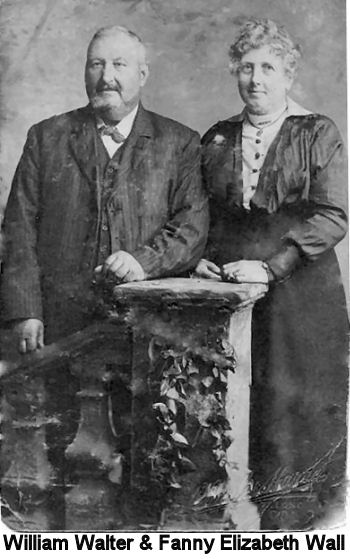
Mr. Wall said that on July 1st he advertised in he Feathered World
for 25 turkey poults. He received a reply on paper headed "Memorandum
from M. McQue, contractor for removal by road or rail, 17, Oakwood Road,
West Croyden. Furniture warehouse." This read: "Dear Sir, - Turkey
poults hatched April 3rd for £3. I can warrant them most healthy. On
receipt of half cash I will forward on and you can forward balance on
receipt. Yours truly, H. McQue." He sent a cheque for 30s., and in reply
received a postcard in these terms: "Dear Sir, - I beg to acknowledge
receipt of your letter and cheque for turkey poults. The matter receives
my best attention. - Yours truly, H. McQue." He had not seen either of
the prisoners, and had not received any poults.
Marriott said he had not had time to send the poults before he was
arrested.
Evidence was called to show that the cheque was cashed at Tottenham
by Mrs. Sleigh, who said that Marriott gave it to her to cash.
Detective-sergeant Storey and Detective-sergeant Webber arrested the
prisoners one in a Post Office and the other at the house. In the house,
which contained not a stick of furniture, was found a number of letters
from persons who had replied to advertisements in The Feathered World"
for poults, asking the advertiser to supply them with turkey poults,
kennels, and fanciers' requisites.
The prisoners, on the application of the police, were remanded in
custody for a week.
|
|
From the Dover Express and East Kent News, 24 October, 1911.
CORPORATION WORKMEN IN PUBLIC-HOUSE
EXTRAORDINARY STATEMENT IN CASE TO-DAY
At the Dover Police Court this morning, before Messrs. J. L. Bradley
(in the chair) and T. A. Terson.
Arthur Edward Clark, 48, George Street, was summoned by Alfred Thomas
Cook, 34, Eaton Road, for assault. Defendant pleaded guilty.
Complainant stated that he was a ganger in the employ of the Dover
Corporation, and on November 18 was engaged working on the tram lines in
London Road. The defendant and another man named Kinch went into a
public house about 10.50, and between that time and 12 o'clock Kinch
went there four times. Eventually he told him hoe would have to knock
off work for the remainder of the day as he was getting in such a state
that he could not carry on his work. Kinch made use of filthy language,
and he said he would go across to his mate, Clark, in a public house.
About 12.45 Clark came to where witness was bending down working.
Defendant said "What sort of a _____ man do you call yourself." Seeing
that although not drunk he was the worse for drink, witness told him he
did not want to talk to him, whereupon defendant gave him an uppercut in
the mouth, loosening a toooth and knocking it through his lip. He also
struck him on the nose twice, and so dazed him that he hardly knew what
he was doing. Clark made another rush at him, but witness warded off his
blows and he fell down. Defendant got up and went for him again, and so
to gave further trouble he fetched a constable, and gave defendant in
charge.
In answer to the Chairman, the witness said the defendant had been in
the public house since 10.30. It was not his business to fetch him out,
but to report it to the foreman.
The Chairman said that was a serious statement to go forth to the
public respecting a Corporation servant, and would like to go a little
further into the case.
Thomas File, a labourer in the gang employed on the work,
corroborated as to the assault. He saw the defendant come down the road
from the public house and strike Cook, but he did not know the name of
the house.
Complainant, re-called, said Clark was in the "New Endeavour" from
10.30 to 12.45.
The Chairman: You are quite sure of that? One wants to be very
careful, because further questioning may take place. You are quite
prepared to prove that he was in the public house from 10.30 to the time
you mentioned? - Yes, as far as I know.
You must know whether he was there or not. - He was absent from work,
and after he went there I never saw any more of him till a quarter to 1.
Are these men allowed to go into a public house like this? - No.
How is it that this man was not stopped? - No notice is taken of a
man provided he goes and gets a drink and comes back at once. I did not
see Clark from 10.30 to 12.30, and it is not my business to go to a
public house to find him.
In answer to Clark, witness said he reported defendant's absence to
the foreman at 12 o'clock.
Defendant said he met a friend and got a glass too much. Kinch told
him what Cook had said, and he suppose that aggravated him. He was sorry
for what occurred.
The Chairman: Were you in the public house during the time that was
mentioned? - I was in the "Old Endeavour," but not from 10.30 to 12.45.
I came out at intervals.
P.C. M. Taylor stated that about 12.55 on November 18 he was called
by the ganger, who complained of having been assaulted by the defendant.
He was bleeding from the mouth. Defendant was very excited and had
evidently been drinking.
It was stated there were previous convictions against the defendant,
the last being in 1906.
Defendant, answering the Magistrates, said he had a wife and three
children, and had been working for the Corporation for seven months. He
earnt on average 23s. a week. He had been discharged from his work and
was now carting for Mr. Dennis.
The Chairman said it was a very bad case. Defendant was in good
employment, and yet he would get that horrid drink and make himself go
muddled that he assaulted the ganger. His conduct was disgraceful. He
was liable to imprisonment, but the Bench had decided to fine him £1
including costs, with a fortnight to pay it. He hoped it would be a
caution to him, and if the defendant came before the Magistrates again
he would not be so leniently dealt with.
Subsequently the Chairman and whether the public house in question
was "Old" or "New Endeavour," he would like the Police to give the
people a word. This kind of thing must be stopped.
|
|
From the Dover Express and East Kent News, Friday, 12 January, 1917.
A PUBLICAN'S MISTAKE
HOUSE OPEN AFTER HOURS ON CHRISTMAS DAY
At the Dover Police Court on Monday, before Messrs. Edward Chitty (in
the chair) and H. Hobday.
William Walter Wall, of the “New Endeavour Inn,” London Road, was
summoned for, on 25th December, allowing intoxicating liquors to be
consumed on his premises at a prohibited hour according to the Central
Control Board. T. Terry, T. Pilcher, J. Jarman, T. Page, C. Gilham and
J. Randley were summonsed for consuming the liquor.
Mr. Vosper appeared to prosecute.
Police-constable Leeming said that on Christmas Day he was on duty at
Buckland Bridge, and was informed by P.C. Scutt that the “New Endeavour
Inn” was open at 8.25 p.m. At 8.30 witness went with P.C. Scutt to the
premises. They went in, and on the bar counter there were several
glasses containing liquor. The bar was three-parts full of men standing
at the counter. Witness saw Mr. Wall behind the counter, and asked him
if he was aware of the time. He replied, “Yes. I am open until 9; but
nothing is to be taken off the premises after 8. P.C. Fox left a
pamphlet with me at the house.” He said that the Order allowed him to be
open from 6.30 p.m. till 9 on Christmas Day. Witness asked him to
produce the pamphlet. He was unable to find it, and said that it must
have blown down. The Constables then left the bar, and, leaving P.C.
Scutt to keep observation, witness communicated with the Police Station,
and shortly afterwards returned. Witness informed the landlord and all
present that he intended to take their names and addresses. Witness took
nineteen names altogether, and there was a total of thirty in the house.
He told the landlord that he should have to report the case, and he
said, “I was under the impression that I could open from 6.30 to 9 p.m.,
as stated in the Order.”
The Chief Constable said that he had 300 of these pamphlets sent to him,
with the request that he should leave them at the various houses, but
there was no alteration in regard to Dover, although there was to some
places.
The defendant said that he had been the licensee of this public-house
for nearly twenty years, and had never been in any trouble. Until the
arrival of P.C. Leeming he was not aware he was doing anything wrong. He
was served with a copy of the Central Control Board's regulations in
regard to Christmas Day. Under paragraph 2a it states that in the
counties of the Western Border area the houses on Christmas Day should
be opened for the sale of intoxicating liquors from 6.30 to 9.p.m. he
thought that that applied to his house, misunderstanding it. On
Christmas day he opened his house at 6.30 p.m., instead of 6 o'clock, as
he was entitled. He thought that he could keep open till 9 o'clock, and
he kept his house open accordingly. When the Constable arrived he told
him that he was entitled to keep open till 9 o'clock, in accordance with
a pamphlet served on him by P.C. Fox.
Mr. A. K. Mowll urged that this was an innocent mistake.
The Chairman said that it appeared that the defendant, although he acted
foolishly, because the circular was perfectly plain, acted innocently,
and the case would be dismissed on the payment of the costs. The cases
against the other defendants would be dismissed entirely. The
Magistrates wished to say that it was a case in which the Police had
acted quite rightly in bringing before them.
|
|
From the Dover Express and East Kent News, Friday,
January, 1920.
DOGS UNMUZZLED
At the Dover Police Court on Friday, before Messrs. H. F. Edwin (in
the chair) , W. D. Atkins and H. J. Burton.
Charles George Ditton, of 90, Oswald Road, was summonsed for allowing
his dog to be at large without a muzzle in London Road, on the 14th
instant.
P.C. Scutt said he found the animal at 7.45 a.m. in a garden in
London Road. Defendant then whistled the dog and it ran up the opening
to Oswald Road, where witness fined it
Fined 5s.
William W. Wall, of the "New Endeavour," who did not appear, was
summoned for a similar offence in London Road on the 14th instant.
P.C. Scutt said he found the dog on the steps of the "New Endeavour."
The Magistrates' Clerk: Apparently it had been out and was waiting to
get in. It was near enough home.
Fined 5s.
Margater Dyer, of 7, Minnis Terrace, was summoned for a similar
offence at Crabble Avenue on January 13th.
Fined 5s.
|
|
From the Dover Express, Friday 20 August, 1926.
Special Sessions for the transfer of licences were held at the Dover
Police Court on Friday, before Messrs. W. B. Brett, T. Francis, H. J,
Burton, and S. Lewis, when the following transfers were made:- The "New
Endeavour,” London Road from Mr. William W. Wall to Mr. Leonard Newbury,
of the Shaftsbury Temperance Hotel, Snargate St., Dover. |
|
From the Dover Express and East Kent News, Friday, 9 January, 1931.
THE “NEW ENDEAVOUR” SLATE CLUB SCANDAL.
TREASURER SENTENCED TO FOUR MONTHS
At the Dover Police Court on Friday last, before Messrs. W. J. Barwick,
C. W. Chitty, G. D. Clark and S. J. Livings.
William Frank Luck, of 11, Castle Hill Road, ex-licensee of the “New
Endeavour Inn,” London Road, was charged, on a warrant, with that he,
being treasurer of the Christmas Club held at the “new Endeavour,”
fraudulently did take and convert to his own use, £6 2s. 6d. received by
him for and on behalf of John Harris, one of the members of the Club.
Mr. De Wet said that he was instructed by the members of the Club to
prosecute. Defendant had held the license since 1928, but for years
previous to that it had been the custom to hold a Christmas Club. Mr. W.
Frost had been the secretary of the Club for seven years, and the
prisoner had been the treasurer since he became the licenser. For the
first two Christmases everything went off all right. This year there
were 78 members of the Club. Fortunately, eight of them had paid nothing
except 2d. for their card. (Laughter.) The other 70 members should have
had available for distribution £168. he did not propose to deal with
each of these 70 cases, and had taken that of J. Harris only. Mr. De Wet
then explained the keeping of the books. Mr. Frost did the “donkey work”
and the prisoner had the money. When Mr. Frost said to him, “How about
the money! It is share out time,” the prisoner said, “I have not got it;
I have spent it.” There should have been £168, and, of course, there was
“a flutter in the dovecote,” and the members wanted to know what was
going to be done. It was arranged that Mr. Frost should meet the
prisoner and the public house valuer. He said that the inventory would
be about £200 odd, and the prisoner would be all right, and the date was
fixed for January 9th, when it was thought the brewers were going to pay
out. The charge was fixed, he (Mr. De Wet) understood, for January 9th.
But what actually happened? They went home rejoicing except two poor
people who had to go away to bury someone and expected that money, but
were not able to get it. But what had been done now? Could anyone
understand a brewery firm like Messrs. Gardner's allowing a man like
this to get into arrears with his payments to them, and the wine and
spirit merchants to the sum of over £300. The brewers well knew this
Club had been in existence for years. The change of tenant did not take
place on January 9th, but last Monday, and when application was made to
the brewers they said, “We have got nothing.” We have taken an
inventory. We have paid the wine and spirit merchants, and the man is
still independent to us about £200.” What did those seventy unlucky
members feel? What was the money saved for? Not only for himself, but to
give pleasure to his household, so that it was not only the seventy
members who had suffered, but seventy times seven. In one family alone
there was £20 which should have been paid out, but they received
nothing. The members felt that some example should be made in this case.
It was absurd that the brewery should take all the inventory, pay
himself and wine merchant, and leave these people. It was for the good
of the house that they should be met, for the Club had been in existence
for years, and the rules required that a certain sum should be paid for
the benefit of the house. This was a case that had given him great
compunction in taking up, but the bench had to consider that the members
were not only the losers of the actual cash, but enjoyment for their
families, and he asked that an example should be made. There was, of
course, a lot to be said for the man, but very little for the brewers.
He understood that the charge, as before them, would be a case for the
Sessions. The members of the Club had not the money to prosecute at the
Sessions, and had no vindictive feeling against the man, although they
felt an example should be made of him. He had discussed the matter with
Mr. Scorer and the Clerk, and if the charge was reduced to stealing as
servant or agent, the Magistrates had power to deal with it. If he had
the assurance that the prisoner would plead guilty, he was prepared that
the amendment should be made.
Mr. Scorer said that moment was not quite the time to do that.
William Arthur Frost said that he was Secretary of the Club.
Mr. De Wet: The brewers are Gardner's?
The Magistrates' Clerk: That has nothing to do with it.
Mr. De Wet: I think it has a lot to do with it.
Witness said that he had been Secretary for seven years under three
different landlords. The prisoner was licensee and also the Treasurer of
the Club. The book produced showed the amount taken every Monday evening
and signed for by Luck as he handed it over. Every member had a card.
Mr. Harris had card No. 38 and according to that he had paid in £6 2s.
6d., which he (witness) had handed over to Luck week by week with other
money. The other book (produced) showed the individual payments of every
member. That for Mr. Harris showed 2s. 6d. a week. In the last week in
October he asked the prisoner how they stood at the bank and he replied
“£150 odd.” He also asked him for some paper bags from the bank. Looking
through his books he found that the amount tallied to a few shillings
with what Luck said was in the bank as the new bags were forthcoming the
following week he thought everything was o.k. On about December 10th he
asked the prisoner about the money as they were sharing out on the 15th.
On the Wednesday he had made all arrangements to draw it out on Friday
or Saturday and added that Saturday would suit him best. He came to see
witness on the Saturday morning to say he had got a hurried note to go
off to Canterbury. Witness told him he couldn't go. He said, “I must go
and we must get it on Monday morning.” He asked witness to be at his
house at 10.30 a.m. on the 15th, but when he got there the prisoner had
gone to Ash to see the brewers, Messrs. Gardner and Company. He enquired
three times between then and 2.30 as to whether he had returned and then
he began to feel there was something wrong and went down to the bank. He
did not see the prisoner till 5 o'clock, as the money should have been
shared at 8 o'clock. prisoner came to witness's house and witness asked
him about the money. He said, “I am sorry, I have spent it.” He asked
him which way and prisoner replied “Week by week, as I took it.” He told
him that he would make arrangements with the members to share out on the
Thursday. When they went for the money they found Mr. Phillips, a valuer
there, and he took the situation in hand. He said that the house was
changing hands and there would be enough to pay the members after he had
paid the brewers. He paid £375 when he went in and owed the brewers
£160. the charge was fixed for January 9th and he said that when the
valuation was completed and the brewers had been paid if Mr. Luck would
instruct him to hand over the “168 4s. 6d. he would do so. He asked for
a letter to that effect for Luck to sign in front of them. He did this
and witness produced it. Instead of the charge taking place on January
9th it took place on Monday last. Not one of the members had had a penny
piece.
The Magistrates' Clerk: That letter did not operate?
No, when we found he was leaving on Monday several of us were round
there and the total valuation paid over was £235 and there was still
£100 owing to the brewers so they took the whole lot and we got nothing.
In reply to Mr. Scorer, witness said that Luck was treasurer for two
years before and everything was all right. There was no audit or
separate banking account, and witness added, “You can see your mistakes
afterwards.”
In reply to Mr. Livings, witness said that the licensee had always been
the Treasurer.
John Harris, 4, South Road, Dover, gave evidence of paying in his money
and not being paid out. On Monday last they waited from 12 o'clock till
half-past four at the change-over determined to get the money of
possible, but got nothing.
D.C. Datlan said that at 2.30 p.m. on Thursday he went to 11, Castle
Hill Road, and saw the prisoner and read the warrant to him. He lade no
reply. At the Police Station when charged he made no reply.
Prisoner was then charged with stealing the money and Mr. Scorer pleaded
guilty on his behalf. He said it was a sad case. He was only 34 and had
been married three years and there was one child, aged eight months.
There was an ingoing of £325 on the house three years ago, £123 being
borrowed money, which was a burden on his back at the start. He was not
there to defend his actions but only to mitigate the punishment. From
1915 ton 1917 he was in the Buffs and was disabled by a gun shot wound in the
eye for which he was receiving a disability pension. His position now
was that he was high and dry and if he went to prison he would probably
lose his pension. The change that took place in the house was not
because of his misappropriation, and the prisoner was hoping that there
would be enough money to pay out the members. He was just as sorry for
the members as he was for himself. He tried to find the money but
failed. For ten months the previous year he was laid up with his eye and
this was probably the reason that his business went down. He asked the
Magistrates to deal with the case under the First Offenders' Act as
there were extenuating circumstances.
The Chairman said that it was a painful case and the Justices felt it
so, but the prisoner must go to prison for four months and hard labour.
|
|
From the Dover Express and East Kent News, Friday, 16 January, 1931. Price 1½d.
THE NEW ENDEAVOUR CASE
(To the Editor of the Dover Express)
Sir,- My attention has been called to your issue of the 9th instant, in
which there appears a report of the proceedings before the Magistrates
at the prosecution of our late tenant of the “New Endeavour,” on 2nd
inst. In that report Mr. De Wet says that “the Brewers well knew that
this Club had been in existence for years.” Mr. De Wet evidently
misunderstood our conversation on the telephone on the previous evening,
as his statement is not true.
W. R. Lister, Managing Director
Gardner & Co., The Brewery.
Ash, near Canterbury.
|
|
From the Dover Express and East Kent News, Friday, 23 January, 1931. Price 1½d.
THE NEW ENDEAVOUR CASE - FURTHER LETTERS
(To the Editor of the Dover Express)
Dear Sir, - I was more than surprised to read in your to-day's issue the
letter of Mr. W. R. Lister relative to his recent prosecution, but in
justice to myself and the 70 unlucky members of the “New Endeavour”
Christmas Club, I feel I must answer it. Appearing for the members
through the Informant, I thought it was only justice that the brewers
(Messrs. Gardner & Co., of Ash) should know that their tenant had that
day been arrested and would come up before the Magistrates the next
morning, and so I telephoned them. I am sorry that Mr. Lister had not
the same courtesy to inform me he was writing to you so that I could
have made a reply in your same issue. However, I am now sending Mr.
Lister a copy of this letter so that his Brewery can (if they so desire)
have a reply and in which event I hope they will send me a copy of the
same day of the dispatch to you. I deny that my statement to the
Magistrates “is not true” nor did I misunderstand “our conversation” on
the telephone. Even from Mr. Frost's evidence the Club had been in
existence for over seven years, and it is strange and incredible that
Messrs. Gardner and Co., and their representatives and collector should
be “in the dark” about the existence of a “Xmas Club” of which, if
necessary, I should have been able to prove their knowledge through
their agents. The judicial proceedings are now ended and I can only hope
that Mr. Lister, on behalf of his Brewery, will see that the members of
this Club will be repaid their contributions in full out of the
Inventory due to his Company from the “Luckless” Tenant.
V. Douglass De Wet.
22, Castle Street.
(To the Editor of the Dover Express)
Sir, - Our attention has been called to your issue of the 9th inst.
under the heading “New Endeavour Case.” In his opening statement Mr. De
Wet said that one of his witnesses attended at the house to meet the
Valuer and that the Valuer made various promises to the members of the
Club. We do not think Mr. De Wet has wilfully misunderstood the position
but his statement is not exactly correct. Our Junior Partner was seeing
Mr. Luck with regard to the valuations when various members of the Club
were brought into the room to ask his advice concerning the club money,
when it was arranged that any sum over and above the amount owing to the
Brewers would be handed to the Club Secretary. It so happens there was
nothing in excess of the Brewers' account.
C. Hebden Phillips & Son,
Sun Buildings, Canterbury.
|
|
Dover Express, Friday, 9 December 1932.
Plans for slight alterations at the "New Endeavour," London Road, were
approved.
|
World war two saw it closed in October 1940 and the reopening came in
1945.
|
Dover Express 20th September 1946.
A meeting of the newly formed Dover Football Club Supporters Association
will be held at the Oddfellows’ Club on Wednesday at 7 p.m. Mr. Lynch has
been selected Chairman; Mr. Vyse, “New Endeavour”, London Road,
Secretary and Mrs. Price will be in charge of the catering. New members
may join at Crabble on Saturday.
|
|
From the Dover Express, 9 January 1948.
DARTS CHAMPIONS
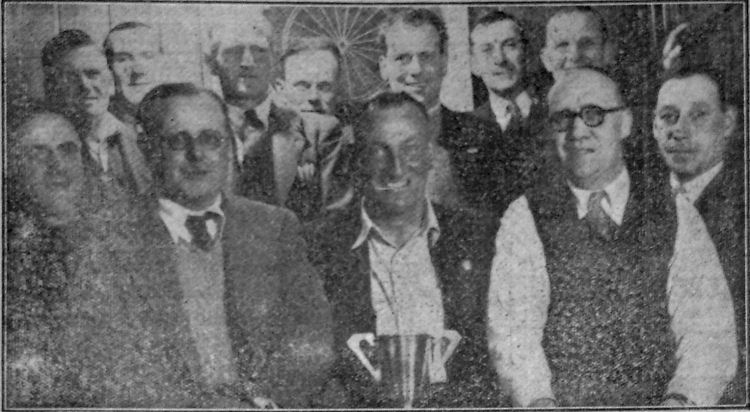
The "New Endeavour" Darts Team, which won the Gardner's Cup with an
unbeaten record in twenty games.
Front Row:- W. White, F. G. A. Bowley (Manager Messrs. Gardner and
Co.) J. Chayney (Captain), H. Vyse (Licensee), and A. White.
Back Row:- Robert Ward, F. Freeman, S. Jackson, W. Hopley, E. Champion,
M. Longley and P. O'Neill.
|
|
From the Dover Express, 19 January 1951.
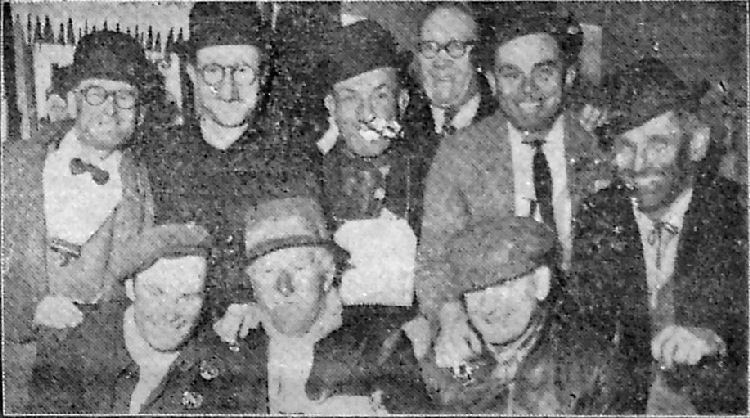
A Tramps' Supper is becoming a popular idea. This one was held at the
"New Endeavour," London Road, on Saturday. [Photo: Hudson.]
Unfortunately, so far, people in photograph, unknown.
An email from Allan Ward (28 July 2012) says he has spotted his uncle
in the photo above on the left with glasses and bow tie. It's Robert
Ward, who came from Ashford and lodged in Dover. He worked on the
railway and unfortunately died in the 1970s.
|
|
From an email received 9 July 2012.
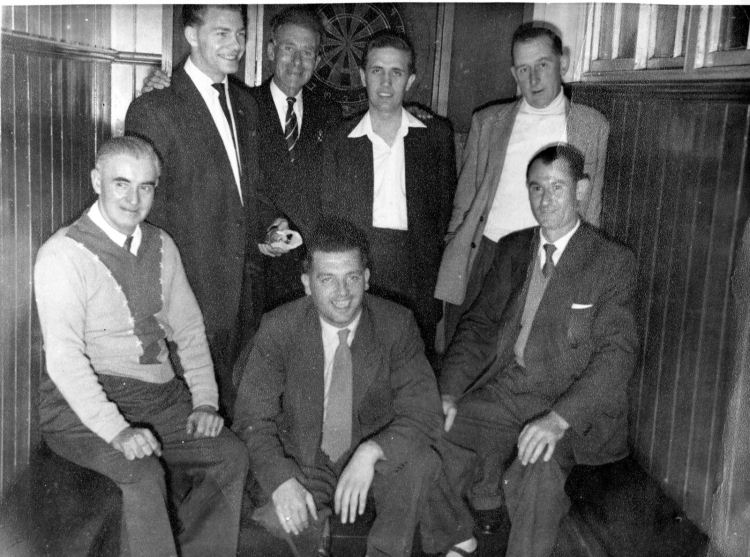
I am attaching a photo of the dart team of the "New Endeavour" which
includes my granddad Charlie Clapson, sitting far left, who was the last
landlord of the pub. I do not have a date for this picture unfortunately
but it was given to me by Alf White, the greengrocer's, sister.
Yours sincerely,
Debbie Fox. |
Charles Clapson retired from here in October 1969 and there is no
evidence of a successor. After 1971, the premises catered for the
do-it-yourself enthusiast up to 1989 and then upholstery.
LICENSEE LIST
EAST Charles 1861-81+ (age 41 in 1861 ) )
STEVENS Fred George to Jan/1882 dec'd (suicide)
 
STEVENS Mary Mrs 1883
CLAYSON Issac Stephen 1886-87+

PENNAL Frederick 1891-95 (age 40 in 1891 ) )
 
WALL William WaIter 1898-Aug/1926 (age 45 in 1911 ) )
      
NEWBURY Leonard Aug/1926-28 end
LUCK William Frank 1928-Jan/31
 
 CARTER Lionel John Jan/1931+
CARTER Lionel John Jan/1931+

PICKARD/PICKUP William 1932-Aug/33
 
 FELLOWS John William Aug/1933+
FELLOWS John William Aug/1933+

PHILLIPS John Charles 1936-Oct/40
  
CLINCH Ernest William Oct/1940+

HUTCHINS Mrs M A 1945
VYSE Harry A 1946-48
 BOWLEY Alfred William Philip Jan-Dec/1949
BOWLEY Alfred William Philip Jan-Dec/1949
 
VYSE Harry A Dec/1948-1953+
 
MILLER William Frederick 1956 end

CLAPSON Charles William 1956-Oct/69
Ernest William Clinch was of the Brewery, Ash, Secretary to Gardner and
Co. Ash.
I believe that Alfred Bowley was manager to Messrs Gardner & Co, brewers,
so may have been just a holding manager at the time.
 From the Post Office Directory 1878 From the Post Office Directory 1878
 From the Post Office Directory 1882 From the Post Office Directory 1882
 From the Post Office Directory 1891 From the Post Office Directory 1891
 From Pikes Dover Blue Book 1895 From Pikes Dover Blue Book 1895
 From the Kelly's Directory 1899 From the Kelly's Directory 1899
 From the Post Office Directory 1901 From the Post Office Directory 1901
 From the Post Office Directory 1903 From the Post Office Directory 1903
 From the Kelly's Directory 1903 From the Kelly's Directory 1903
 From the Post Office Directory 1913 From the Post Office Directory 1913
 From the Post Office Directory 1922 From the Post Office Directory 1922
 From Pikes Dover Blue Book 1924 From Pikes Dover Blue Book 1924
 From the Post Office Directory 1930 From the Post Office Directory 1930
 From Pikes Dover Blue Book 1932-33 From Pikes Dover Blue Book 1932-33
 From the Post Office Directory 1938 From the Post Office Directory 1938
 From Pikes Dover Blue Book 1938-39 From Pikes Dover Blue Book 1938-39
 From the Kelly's Directory 1950 From the Kelly's Directory 1950
 From the Kelly's Directory 1953 From the Kelly's Directory 1953
 From the Kelly's Directory 1956 From the Kelly's Directory 1956
 From the
Dover Express From the
Dover Express
 Census Census
|









